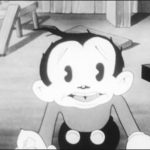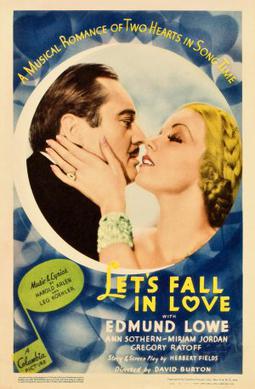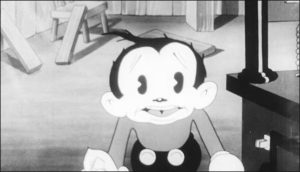


The 1933-34 film season was reasonably good for Columbia despite the depths of the depression. In spite of the flop of The Bitter Tea of General Yen, a critical success but a box-office failure, Columbia was enjoying financial success with Lady For a Day, a film which proved that Damon Runyon’s short stories provided excellent film fodder. And with eyes toward the close future, Columbia bought the rights to a short story, “Night Bus”, which would be made into one of the most successful movies of the period, It Happened One Night.
 Columbia was also starting to get into the field of two-reel comedy shorts. They were going through a series of musical shorts concocted by songwriter Archie Gottler, which would culminate in the first of a long series of shorts featuring the firm of Howard, Fine, and Howard. They were even getting back into musicals, having an actual hit song from the title number of Let’s Fall In Love with Ann Sothern and Edmund Lowe. The cartoon department meanwhile didn’t have any stellar successes, but were producing a consistent line of cartoons that may well have pleased exhibitors and audiences alike.
Columbia was also starting to get into the field of two-reel comedy shorts. They were going through a series of musical shorts concocted by songwriter Archie Gottler, which would culminate in the first of a long series of shorts featuring the firm of Howard, Fine, and Howard. They were even getting back into musicals, having an actual hit song from the title number of Let’s Fall In Love with Ann Sothern and Edmund Lowe. The cartoon department meanwhile didn’t have any stellar successes, but were producing a consistent line of cartoons that may well have pleased exhibitors and audiences alike.
The Bad Genius (12/1/32) – Scrappy is promoting a concert by Oopie who is being presented as a wunderkind. But Oopie wants to play like the other kids, and when he’s tired, he wants to sleep. Scrappy keeps having to wake him up to play his concert piece. Oopie’s masterpiece turns out to be nothing much to write home about. Song: The score is built around a recognizable number that would later be swung by Woody Herman, “La Cinquantine” (sometimes known as “The Golden Wedding”), composed in 1887 by Jean Gabriel-Marie. Hagar’s Orchestra recorded a Zonophone version circa 1903. McKee’s Orchestra, the white orchestra appearing at the Castle House, recorded an early version for Victor. Mischa Elman got the high-price version on Victrola. A salon version also appeared on Victor by the Neapolitan Trio. W. H. Squire, a cellist, issued a 20’s version on English Columbia. Saxophonist Rudy Wiedoeft issued both Victor and Columbia versions. Cedric Sharpe issued a European pressing on Electrola. Woody Herman had the hit on Decca (embed below). Jan Savitt covered it for Victor. Joe Biviano did an accordion version on Sonora.
Sassy Cats (1/25/33) – A cat is walking the fences, meowing to the tune of “Oh, How I Miss You Tonight.” The feline is trying to attract Scrappy’s cat, but she can’t open the window. The Tom offers to break the window, but is dissuaded by the man in the moon. Eventually Scrappy gets up and lets his cat out rather brusquely. Before Scrappy knows it, every cat in the neighborhood is coming to his house. After a bit of a palaver with a vacuum cleaner with which Scrappy trues to collect all the cats and dump the out, Scrappy concedes by letting the cats stay inside, and himself sleeping on the backyard fence. Songs: “Oh How I Miss You Tonight”, a tender waltz ballad from 1925, which even in the day got occasionally played as a fox trot. Recordings include The Cavaliers on Columbia. The Benson Orchestra of Chicago on Victor electrical. Lewis James had a Victor vocal. Sam Lanin (as the Broadway Broadcasters) performed the Cameo version. Allen McQuahe, a tenor, issued a 1924 version on Brunswick. Arthur Fields performed anonymously as Mr. X on Grey Gull. Franklyn Bauer got the Banner/Domino/Regal version. Bing Crosby later did it for Decca (below). So did Dick Robertson on the same label. Tommy Tucker Time performed a 40’s Okeh. Les Brown gave it the big band sound on Columbia. Sammy Kaye also performed a Columbia side. Jeanne Black issued a 1961 Capitol single.
Bunnies and Bonnets (3/29/33) – Krazy is getting ready for the Easter Parade. There are also am abundance of small rabbits (proving that 1 + 1 equals 8), and even baby chicks (not coated in marshmallow and sugar. Song: “I’m Always Chasing Rainbows” a 1918 pop song based on a theme by Chopin. Recorded in 1918 by Harry Fox on Columbia, Charles Harrison on Victor, the American Republic Band on Pathe, Sam Ash on Emerson, and in the 1940’s by Judy Garland on Decca, Dick Haymes and Helen Forrest on Decca personality series, Perry Como on RCA Victor, Harry James on Columbia, Guy Lombardo on Decca, the Pied Pipers on Capitol, The Organ, the Dance Band, and Me on Parlophone, Paul Fenhoulet and the Skyrockets Dance Orchestra on HMV, and Peter Yorke on English Columbia.
The World’s Affair (6/5/33) – Scrappy and Oopie are presenting a program at the Century of Progress Exhibition in Chicago. (This is one of two films in which the voices of Scrappy and Oopie are provided by real children, who are definitely not trained in acting, and must have been relatives of someone in the studio.) This exhibition shows the latest advances in science, fashion, and other things. And there is the usual quota of celebrity caricatures, as are often found in Columbia cartoons of this vintage. Song: “Chicago (That Toddlin’ Town)”, a 1922 pop song, recorded by a plethora of dance bands. Paul Whiteman on Victor (below), the Georgians (a hot contingent from Paul Specht and his Hotel Alamac Orchestra) on Columbia, Markel’s Orchestra on Okeh, Bailey’s Lucky Seven on Gennett, and [Ernest L] Stevens Trio on Edison. It became a standard and was recorded by Nat Gonella and his Georgians on Parlophone, Coleman Hawkins and his Orchestra (actually performed with a Dutch band called The Ramblers) on Dutch Decca, also issued here, and Ted Phillips’ Quintet on English Decca in 1950. In later years, it was recorded vocally by Frank Sinatra on Capitol, Eydie Gorme on her “Vamps the Roaring 20’s” album for ABC Paramount, and Tony Bennett from a session for Columbia.
Out of the Ether (9/5/33) – A collection of parodies of radio stars of the day. Not enough plot to hang your hat on, except for Krazy Kat performing a surgical operation sequence that turns out to be nothing but repairing a radio. Song: “Copengahen”, a 1924 composition by Charlie Davis, Indiana’s most popular bandleader. Recorded by the Wolverine Orchestra on Gennett featuring Bix Beiderbecke on cornet, The Benson Orchestra of Chicago on Victor, The Oriole Orchestra on Brunswick (jointly led by Dan Russo and Ted Fio Rito), Fletcher Henderson on Vocalion featuring Louis Armstrong on cornet, Boyd Senter and his Senter-pedes on scroll Victor electrical, Ambrose and his Orchestra on English Decca, Artie Shaw on Bluebird, and the Firehouse Five on Good Time Jazz, among others. There were also lyrics written to it, first recorded by Kitty Irvin on Autograph, and Teresa Brewer on London in 1950.
 Scrappy’s Television (1/29/34) – Scrappy is putting on a presentation of television, which was still experimental at the time, and limited to the larger cities. After a few blown tubes and other contretemps, caused mostly by the slingshots of Oopie and a few local pets in the audience, Scrappy manages to pull in a concert violinist. Oopie pulls a lever to start switching channels to more lively music, and while being chased by Scrappy, the pets do some lever-pulling too, drawing in images of various barnyard animals. Finally, the set tunes itself to a big prize fight between a caricature of fighter Max Baer and the old fire chief himself, Ed Wynn. It’s a total mismatch, but Wynn ultimately scores a lucky punch, winning the bout on a fast count by the referee. The fans in attendance at ringside start a riot, throwing things at Wynn and the ref. Oopie and the pets get carried away, throwing large objects at the screen, and ultimately wreck the machine, causing it to tune in nothing but an image of a cuckoo bird. Song: “Serenade (Standchen)”, written by Franz Schubert. The Zonophone Concert Band had an early version on such label. Other versions included The Neapolitan Trio on Victor, a demo record widely distributed by Columbia on its metallic-colored flag-label design by Charles Hackett(as a flip side to “Ted Lewis Popular Favorites”), Mischa Elman on Opera Company Disc, an enterprise that generally used older masters from Victor, HMV or G&T, Rena Pfiffer (soprano) for Brunswick around 1927, Tino Rossi on French Columbia, Richard Tauber on Odeon, Jesse Crawford on Decca, John Kirby on V-Disc and possibly Columbia, the Melachrino Strings on RCA Victor circa 1950, James Melton on RCA red seal, and Earl Bostic on King. The song gad also featured prominently in an earlier Walter Lantz cartoon, Oswald’s “Radio Rhythm”, in which it was played in both off-key and jazzed-up versions.
Scrappy’s Television (1/29/34) – Scrappy is putting on a presentation of television, which was still experimental at the time, and limited to the larger cities. After a few blown tubes and other contretemps, caused mostly by the slingshots of Oopie and a few local pets in the audience, Scrappy manages to pull in a concert violinist. Oopie pulls a lever to start switching channels to more lively music, and while being chased by Scrappy, the pets do some lever-pulling too, drawing in images of various barnyard animals. Finally, the set tunes itself to a big prize fight between a caricature of fighter Max Baer and the old fire chief himself, Ed Wynn. It’s a total mismatch, but Wynn ultimately scores a lucky punch, winning the bout on a fast count by the referee. The fans in attendance at ringside start a riot, throwing things at Wynn and the ref. Oopie and the pets get carried away, throwing large objects at the screen, and ultimately wreck the machine, causing it to tune in nothing but an image of a cuckoo bird. Song: “Serenade (Standchen)”, written by Franz Schubert. The Zonophone Concert Band had an early version on such label. Other versions included The Neapolitan Trio on Victor, a demo record widely distributed by Columbia on its metallic-colored flag-label design by Charles Hackett(as a flip side to “Ted Lewis Popular Favorites”), Mischa Elman on Opera Company Disc, an enterprise that generally used older masters from Victor, HMV or G&T, Rena Pfiffer (soprano) for Brunswick around 1927, Tino Rossi on French Columbia, Richard Tauber on Odeon, Jesse Crawford on Decca, John Kirby on V-Disc and possibly Columbia, the Melachrino Strings on RCA Victor circa 1950, James Melton on RCA red seal, and Earl Bostic on King. The song gad also featured prominently in an earlier Walter Lantz cartoon, Oswald’s “Radio Rhythm”, in which it was played in both off-key and jazzed-up versions.
Tom Thumb (2/16/34) – Up until 1934, Krazy Kat had not done many forays into the storybook type of cartoon. This cartoon has precious little to do with the story of Tom Thumb, and much to do with a romance between Krazy and Kitty, and with a malevolent spider who tries to take Kitty off to his lair. Krazy rescues Kitty, and there is every indication there is a wedding, though we do not know who is the best man or parson. Song: an original song whose title is not easily discerned from the lyric, heard at both the beginning and end of the cartoon proper, and used as exposition.
NEXT: More mid-30’s.